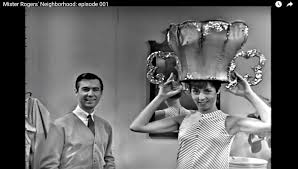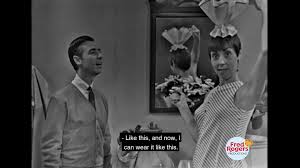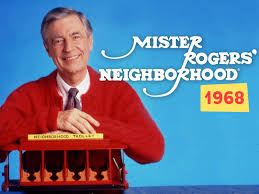Why We Need Mr. Rogers
I know it’s an odd title for a blog post because there should not be a “why” behind it, but frankly I’m sleep deprived and couldn’t think of a better one. Mr. Rogers has been on a lot of people’s minds recently- the fantastic documentary “Won’t You Be My Neighbor?” that came out last year (a theater near us handed out tissue packs to adults who would soon be overcome with sentiment and nostalgia) and the recent Tom Hanks movie “A Beautiful Day in the Neighborhood”. Also, side note, in my world, Tom Hanks can play pretty much anything, and I can’t wait to see him as Mr. Rogers.
When I was growing up, we rarely watched television. We weren’t really allowed to during the week (though my parents always watched Dallas and my mom watched some soap operas), and while my younger brother and I loved Saturday morning cartoons we were just as likely to be out in the woods. But I watched plenty of PBS. We watched Sesame Street and Nature and Mister Rogers’ Neighborhood and I loved it all. Later on, in graduate school, we would spend a large amount of time discussing the children’s shows on PBS and how they changed the world for so many children who might not have the privilege of private preschool, or literate parents, or get to go to kindergarten with enough information to thrive. What we rarely discussed was how good PBS shows were for us- how they could change our lives by bringing concepts to us in a way that we could truly understand.
But Mr. Rogers took it further, and I tucked him away happily in my fondest memories. Until my daughter was born. I was determined to follow all the rules with her, and I did. She rarely saw a screen (except when she was hospitalized as a baby), and I spent hours on the floor building towers with her and distracting her from the large black box that beckoned (and that we partook of once she was asleep for the night). Family members were instructed not to watch tv while staying with us, and it made for some memorable debates about screen time and developing brains.
Then I had our second child. That’s when things changed. I convinced myself my daughter was “finally old enough” to have alllll the screen time. We needed it to get through those first few months as we battled a host of other things that come along with a second child. But I wanted it to be somewhat high quality. So I turned back to PBS. Often I would nurse and my daughter would sit with me as we quietly watched old favorites. She adored Elmo and we watched Sesame Street a lot. Then, one day, Mister Rogers’ Neighborhood showed up on my Amazon feed and I felt the same way I felt at age 5. Hearing the opening song I could almost feel the early morning summer days of my childhood unfolding before me. But daughter? Yea, no. She threw a fit to watch something else so we did. And we moved on.
Until my husband and I used a rare date night to head to the Rialto theater and see Mr. Rogers on the big screen. It opened with the famous “It’s a beautiful day in the neighborhood…” and from there I pretty much cried off and on for the next two hours. I learned more than I ever could have known as a child watching him. Learned about his way with kids everywhere, learned his reasoning for going through hard events with children, and watched his infamous speech in front of Congress, successfully saving PBS funding and turning the chairman of that committee to mush. I watched as he put his feet in a pool with the feet of a person of color during the sixties, and how he dealt with Jack Kennedy’s assassination in the Neighborhood of Make-Believe. As a vegetarian Presbyterian minister he did it all. At the end, when the lights came up, I cried, because our world lost so much with him. But I also went home determined for my children to get to know him. They already adored Daniel Tiger’s Neighborhood (if you are a parent, and you need a jingle for potty training, being kind, nightmares, or birthday cakes, this should become your new favorite show).
So one afternoon, when my daughter and I were playing downstairs while her brother napped, I decided to give her the gift of Fred Rogers. I pulled up the very first episode from the 1950s, and hit play. Immediately she complained that it was in black and white. I told her she didn’t have to watch it but that I wanted to. There is nothing that makes you feel more like a parent than telling your kid you’re doing a kid activity because you want to, and if they don’t want to participate they can just step out. I could swear there was an eyeroll, but she went with it. And thirty seconds in, we were invested in Mr. Roger’s fish. We watched as Mrs. Russelite invited Mr. Rogers to see her extensive lampshade collection, and then she questioned why King Friday was being mean and wanted to build a wall to keep people away from his neighborhood (I am so serious when I say Mr. Rogers addresses everything).


It ended, leaving us sitting quietly and pondering things like lampshades and friendships. Then, she turned to me and said “I want another.” This was the beginning of a beautiful friendship. Over the course of the next year, as we moved slowly through the episodes, my children became interested in making puppet theaters, paper hats, fish on wands to pretend to be in the sea, and watching an older man literally sit and play with a line of string for at least five minutes. They begged me to help them set up 3000 dominoes (thankfully we were able to settle on setting up the 12 that I own). Mr. Rogers addressed issues that we all need to discuss with our children but don’t always want to, and he did it with kindness and grace. His soft, lilting voice pulled them in. I watched them sit, and their breathing slow as they relaxed into his world. By this time they both had their own Daniel Tiger trolleys, and we still loved him as well, but Mr. Rogers had a whole different affect on them. It seemed to change the way they were looking at a world in which children are inundated with large amounts of information that we weren’t. It helped them process.
The most magical thing about having this experience with my own children is that even though I know that their experience was unique, and that they got to see even earlier episodes than I did (1980s tv for the win!) Mr. Rogers remained the same. Quiet, contemplative, serious, joyful and loving. He always gave them time to understand and ask questions, though he could not hear his audience. All qualities in that children need to see more of in grown-ups.

Which brings me to my own contemplation of how to balance parenting in a world that insists on screens to replace human contact, and how to help my children understand that there was a man who loved every child, even if he never knew them. A man who could exude love and understanding and hope through a television screen. A figure who is still doing that today. How do we work with that understanding of what screens can be for children and reconcile it with the most important work of childhood- play? My daughter’s teacher recently informed me that she will be tested on her reading skills using a computer this year instead of reading to a person. When I asked about data, there wasn’t anything significant. In the same conversation she sadly let it drop that some elementary schools are doing away with play centers in kindergartens, such as toy kitchens, baby dolls, etc. While play is the most important developmental aspect of early childhood our current trend is to take time away from that in the hopes that our children will learn algebra a little earlier.
There were plenty of times Mr. Rogers’ show was criticized and questioned, and know there were plenty of times he questioned himself. But the immensity of the gratitude I feel towards him for standing up for the most innocent of our population, for wanting to guide children and parents into being better versions of our own selves. He reminds us that we should always do our best, that we should always offer kindness, that we should look for helpers in hard times, and that there are hard times for every generation. Even though we have watched every episode available to us, I know that when my little people are having a hard day and I don’t know what to say, Mister Rogers will. Thank you, Mister Rogers, for being a helper in the hard times, and in the good, and helping us remember that we are guiding the most important citizens in our world.
Parents are like shuttles on a loom. They join the threads of the past with threads of the future and leave their own bright patterns as they go.- Fred Rogers
